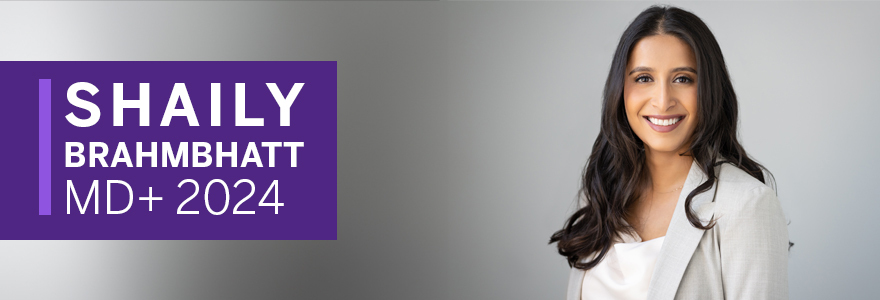Grad embraces the many possibilities of trying something new

By Natalie Ebel
Shaily Brahmbhatt is no stranger to trying something new.
Throughout the last decade of her schooling at Western and Schulich School of Medicine & Dentistry, Brahmbhatt experienced a fascinating collection of firsts. She was part of the first cohort for the School’s competency-by-design undergraduate module, she transitioned to a hybrid curriculum during the COVID-19 pandemic, and she was one of the first students to participate in the MD+ program. The MD+ track helps students personalize their learning and offers them the time, financial and academic support to pursue professional and graduate training while completing their medical degrees.
Brahmbhatt remembers her excitement at the prospect of being able to help mold something for future generations of medical students, and she now looks back on the MD+ program with pride to see how it has evolved in just two years.
Today, as she graduates with her Doctor of Medicine and Master of Public Health degrees, Brahmbhatt is continuing her trend of trying something new as she prepares to start her general surgery residency at the University of British Columbia.
What inspired you to pursue your Master’s in Public Health, and how has your experience helped you achieve your goals?
For the last 10 years at Western and Schulich Medicine & Dentistry, I have been in awe of the passionate and dedicated students I call my colleagues and friends. Their commitment to the local and global community builds a culture of innovation and advocacy, inspiring me to pursue additional training during medical school.
Recognizing the existing demands of time and energy during medical school, I pursued a Master’s in Public Health (MPH) to gain skills in driving systemic change in policy and research. These skills allow me to effectively contribute to efforts toward reconciliation as a settler and medical training in this system. During the program, I learned more about global surgery, quality, improvement, and the policy writing and implementation process. These are all aspects that I hope to carry forward into my residency training and work as a future surgeon. The more I have learned, the more I realize how much more I have to explore and understand.
What motivated you to take part in the School’s MD+ interdisciplinary program?
When I first heard about the MD+ program, I was drawn to the opportunity to be a part of something new. At that point, I’d already been a part of the first cohort of the competency-by-design undergraduate curriculum and transitioned to a hybrid curriculum during the COVID-19 pandemic. So, being a part of something new wasn’t foreign to me, and I was excited by the prospect of being able to build something for future generations of medical students. I was always interested in research and quality improvement and anticipated having to complete a graduate degree at some point in my training. One could say it was a combination of existing interest in the field and being at the right place at the right time.
As one of the first students to participate in the MD+ program, what was the highlight of the program for you?
Being a part of something new is exciting, but also a little scary. I can’t say that it was always easy, but I am grateful to the School for supporting my goals and my success in the program. The mentors and friends I found through the process supported me through the highs and lows of medical training, and I really couldn’t have gone through the last five years without them. Looking back on the experience, I am very proud of how far the MD+ program has come and to see how it has evolved.
Being part of the program also fundamentally changed how I saw my role as a physician and a community member. The colleagues I met through my journey are people who will change the world. Working with and learning from them has helped me appreciate the strength of collaboration and respect for diverse voices as we work toward building a healthier and safer future for all people.
The colleagues I met through my journey are people who will change the world. Working with and learning from them has helped me appreciate the strength of collaboration and respect for diverse voices as we work toward building a healthier and safer future for all people.
--Shaily Brahmbhatt
What advice do you have for students considering the MD+ program?
MD+ has taught me to keep an open mind and welcome the off-script adventures that come along the way. I encourage current and future medical students to consider the MD+ program if they want more time with something that interests them. Every opportunity can teach you something that will help you become a better physician. In my case, my understanding of public health fundamentally and positively changed how I navigated interactions with patients and other health-care providers during clerkship and electives.
What are your future career plans, and how do you hope to make an impact in your field?
I am excited to start my general surgery residency at the University of British Columbia soon. I was first introduced to the global surgery work done at UBC during my MPH, and I’m excited to learn from them as I grow as a surgeon and researcher.
What is something you want people to know about you?
I spend most of my free time trying to make my cat famous on Instagram or learning a new musical instrument. My most recent project has been learning the lyre harp, which appeared in our Tachycardia show (if you know, you know).









